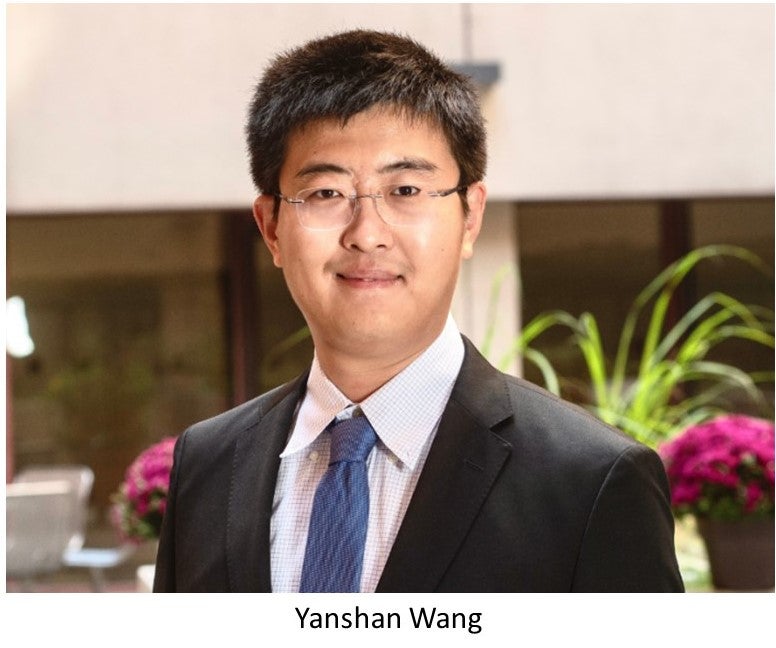 Health is impacted by life circumstances. Inequities in education, transportation, housing and employment all have negative impacts on patients’ health, especially chronic conditions and mental health. These patients are also less likely to participate in research studies. In addressing health inequities, clinicians must identify patients in need of clinical outreach, and researchers must reach patients in communities that are underrepresented in research studies.
Health is impacted by life circumstances. Inequities in education, transportation, housing and employment all have negative impacts on patients’ health, especially chronic conditions and mental health. These patients are also less likely to participate in research studies. In addressing health inequities, clinicians must identify patients in need of clinical outreach, and researchers must reach patients in communities that are underrepresented in research studies.
Yanshan Wang, hopes to address both questions by applying artificial intelligence techniques to mining data in patient electronic health records (EHR). With the support of a 2022 Pitt Momentum Fund Seeding grant, he has been able to develop algorithms supporting an informatics platform to recruit people from underrepresented populations in health research studies, as well as an algorithm for a patient education mobile app for patients with minimal health literacy, as determined their individual EHRs.
“EHRs are underutilized partly because they’re not all created in the same formats,” explains Wang, vice chair of research in the Department of Health Information Management in the School of Health and Rehabilitation Sciences. “Some are written in text; some are structured fields in a program. They are not written in the same language. Information about social determinants of health – transportation access, educational level, housing, employment – and other health issues are not coordinated. I believe we can use the EHR to improve patient care and address health equity issues using what is known as Natural Language Processing (NLP) to extract information from clinical notes and combine that with the digital information.”
After beginning in computer science, Wang realized while working at the Mayo Clinic that the next generation of data science was in medicine. EHRs helped produce exponential growth in data, and Wang began studying that data using NLP and other artificial intelligence techniques.
“At the Mayo Clinic I began using big data to extract family histories from cancer patients,” he explains. “Doctors traditionally write down or dictate this information as what is known as ‘free text.’ We developed NLP systems to extract and analyze the family history data from these cancer patient records, so a physician can run the NLP algorithm to find the family history to assess cancer risks.” Another project involved radiology reports on bone fracture data for rheumatoid arthritis patients. Data on the location, cause and severity of fractures, were mostly in free text, making it impossible to create a full picture combining the data captured in digital formats.
Wang incorporates health informatics techniques directly into medical education at Pitt.
“Most of my post-professional graduate students are health care workers – doctors, nurses, administrators – with no technical background in data science,” he says. “Pitt has very strong research capacity. We collaborate with the Pitt Clinical and Translational Institute and UPMC on practical projects pulled directly from data about our community in Western Pennsylvania. Our students learn to build machine learning models using real-world data to solve real-world medical questions.” Wang describes Pittsburgh as one of the best health care and technology environments in the country.
The health inequities project was greatly helped by the Momentum Fund grant. Wang’s team used the support to establish both the algorithm for the mobile patient education app and the AI algorithm for identifying research subjects. They have now applied for two separate National Institutes of Health grants – one grant from the National Institute for Minority Health and Health Disparities for building the infrastructure for the patient education app, and one grant from the National Center for Advancing Translational Studies for building the infrastructure to identify research subjects from underrepresented groups.
“The method is already there,” says Wang. “And we could not have developed it without the Momentum Fund grant. Now we just need to take the work to the next level and create and deploy the infrastructure.”
- Brian Connelly
Read more about this project and other Momentum Fund grants on Pittwire >>
Interested in finding funding for your innovative research project in any field ranging from health inequities to history? Learn more about the Pitt Momentum Funds program.
